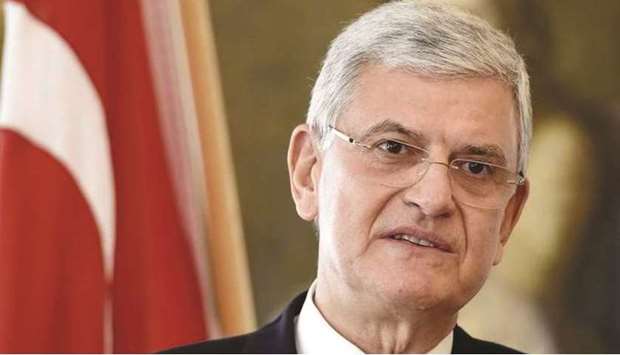One year after the Covid-19 pandemic took hold, many of us are still grappling with the ‘new normal’. As the president of the United Nations General Assembly, I am proud to report that the United Nations and its 193 member states remain steadfast in our solidarity and commitment to combat the pandemic and meet the needs of the people we serve.
No-one has been spared from the impact of this crisis. Some 2.7 million people have succumbed to the effects of the Covid-19 virus, which has had a severe impact on families and communities. The global economy shrank by 4.4% as an estimated 255 million jobs were lost in 2020, pushing people back into poverty. Right now, 34 million people are on the brink of starvation, and 235 million people will require humanitarian assistance and protection in 2021 – an increase of 40% from last year.
It is clear that those who were already struggling to make ends meet before the pandemic, have been disproportionately impacted. For refugees living in camp settings, social distancing and hand washing are luxuries beyond reach. For people living in conflict settings, peace may feel unattainable. More women and girls experienced violence in their homes as a result of lockdowns. People living in Small Island Developing States, Least Developed Countries, Landlocked Developing Countries, and countries experiencing desertification face the triple threat of the virus itself, the related socio-economic fall-out, and the existential threat of climate change. At the same time, we have witnessed the rise of extremism and hate in the forms of racism, xenophobia, Islamophobia, anti-Semitism, and anti-Asian violence.
No doubt, this is the greatest multi-faceted challenge the world has experienced since the United Nations came into existence 75 years ago.
However, this is exactly why the United Nations was created: to save the world from ruin, to give hope at times of despair, to demonstrate solidarity, and to protect and uphold the rights of everyone, everywhere.
This crisis struck at a time when the organisation faced its worst liquidity crisis in recent years, yet the UN has stepped up.
Since the start of the 75th Session, the General Assembly and its Main Committees have adapted working methods in accordance with medical guidance in order to mitigate risks for delegates. This has allowed me to convene in-person meetings for the implementation of essential mandates.
At the special session of the UN General Assembly on the coronavirus response, convened in December, there was a shared sense that the international community can turn the Covid-19 crisis around and recover better, guided by the 2030 Agenda for Sustainable Development and the protection of human rights.
Governments recognised the need for the equitable and fair distribution of vaccines, and voiced their support for the WHO-led ACT-Accelerator and Covax facility. Most recently, on March 26th, 181 countries endorsed a Political Declaration on Equitable Access to Covid-19 Vaccines, demonstrating the bold and principled solidarity of the membership. It remains clear that the only path forward is through equal and fair distribution of #Vaccines4All.
For the remainder of the 75th session, the General Assembly will address some of the most critical issues of our time: from digital co-operation and connectivity to the protection of our oceans, culture and sustainable development to the prevention of land degradation, desertification and drought. The special session against corruption in June will result in a high-level political declaration demonstrating the international community’s zero tolerance approach to corruption.
Many of these issues pre-date the pandemic, and will require investment and consideration even at this time of crisis to safeguard the future of the world. Although our operating environment has changed, our duty to the people of the world has not.
Member states play a vital role in every facet of our work from the promotion of multilateralism, the maintenance of international peace and security, to achieving sustainable development and upholding fundamental human rights.
The support of member states such as Qatar is essential. In the General Assembly, Qatar has co-facilitated the intergovernmental negotiations to commemorate the seventy-fifth anniversary of the United Nations, initiated the resolution which created the International Day to Protect Education from Attack, and co-founded the Group of Friends of Solidarity for Global Health Security.
As a troop contributing country which promotes a culture of peace, promotes intercultural and interfaith dialogue, and supports humanitarian assistance and development aid, Qatar is committed to advancing the work of the United Nations.
Most recently, Qatar and the UN signed multiple agreements to open new UN offices in Doha which will include a United Nations Development Programme (UNDP) office to promote sustainable development goals at the global level and a new UN Office for the Co-ordination of Humanitarian Affairs (OCHA) to support the global humanitarian operations through partnerships with national and international actors.
Consistent support of the United Nations such as this, from policy to practice, is essential if we are to make up ground on the hard-earned gains made towards achieving the 2030 Agenda for Sustainable Development which the pandemic has eroded.
In this Decade of Action, ambitious leadership of member states like Qatar reminds the world of our collective responsibility to meet the needs of the people we serve.
If we are to recover better, all member states must re-commit to multilateralism. Let us not forget that we, the peoples will — through our action or inaction — determine the fate of future generations.
• Volkan Bozk?r is President of the 75th session of the United Nations General Assembly.

VITAL: u201cThe support of member states such as Qatar is essential,u201d says Volkan Bozk?r.
